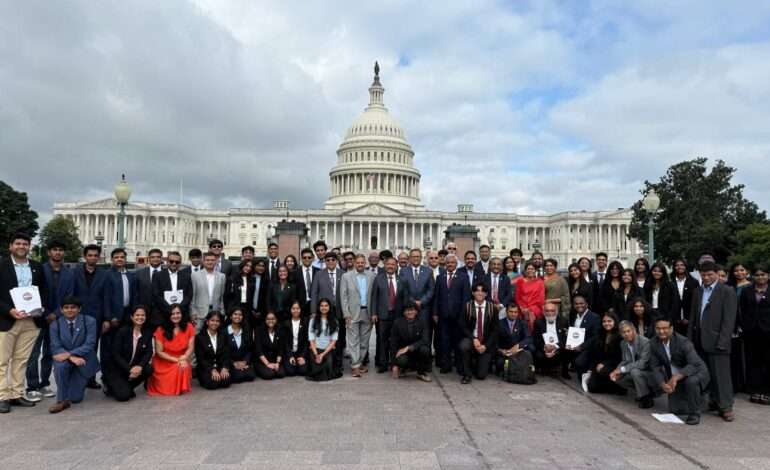
US-India summit on Capitol Hill highlights strategic ties and diaspora engagement
Nearly 150 Indian-American delegates from across the United States gathered on Capitol Hill on July 15, 2025, for the US-India Partnership Summit and Legislative Day, organized by the Foundation for India and Indian Diaspora Studies (FIIDS). The event underscored the growing importance of U.S.-India strategic cooperation and the increasing influence of the Indian-American community in shaping bilateral policy.
Participants engaged in discussions with more than 120 lawmakers, addressing a range of issues including trade, security, immigration reform, counterterrorism, and technological collaboration. Alliances such as the Quad, I2U2, and IMEC also featured prominently in the agenda.
India’s Ambassador to the United States, Vinay Kwatra, lauded the event and the role of the diaspora in bridging the two democracies. “The diaspora serves as a living bridge between our societies, economies, and nations,” he said, noting the shared values that continue to drive the partnership forward. FIIDS President Khanderao Kand emphasized the substantive nature of the conversations with lawmakers. “These meetings were not just photo ops,” Kand said. “Delegates addressed pressing topics like AI, critical minerals, quantum computing, Indo-Pacific security, and the EAGLE Act.”
FIIDS President Khanderao Kand emphasized the substantive nature of the conversations with lawmakers. “These meetings were not just photo ops,” Kand said. “Delegates addressed pressing topics like AI, critical minerals, quantum computing, Indo-Pacific security, and the EAGLE Act.” Members of Congress echoed the summit’s message of deepening collaboration. Representative Raja Krishnamoorthi (D-IL) highlighted the dramatic rise in U.S.-India trade—from $20 billion in 2000 to over $200 billion today—and described the relationship as “stronger, deeper, and wider.”
Members of Congress echoed the summit’s message of deepening collaboration. Representative Raja Krishnamoorthi (D-IL) highlighted the dramatic rise in U.S.-India trade—from $20 billion in 2000 to over $200 billion today—and described the relationship as “stronger, deeper, and wider.” Representative Ro Khanna (D-CA), co-chair of the Congressional Caucus on India and Indian Americans, emphasized the need for continued political engagement from the Indian-American community. “Progress takes persistence,” Khanna said. “The work FIIDS is doing is critical in advancing the long-term strategic interests of both our nations.”
Representative Ro Khanna (D-CA), co-chair of the Congressional Caucus on India and Indian Americans, emphasized the need for continued political engagement from the Indian-American community. “Progress takes persistence,” Khanna said. “The work FIIDS is doing is critical in advancing the long-term strategic interests of both our nations.”
Khanna also expressed congressional support for India’s right to self-defense following the recent terror attacks in Pahalgam, framing India as a vital military, economic, and technological partner. The summit closed with a bipartisan consensus that U.S.-India relations are not only critical to the two nations but essential to ensuring global stability in the 21st century.
The summit closed with a bipartisan consensus that U.S.-India relations are not only critical to the two nations but essential to ensuring global stability in the 21st century.